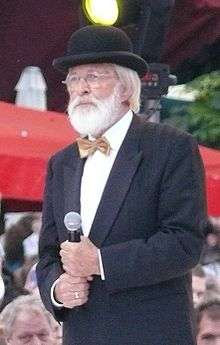Pierre Kartner
| Pierre Kartner | |
|---|---|
 Pierre Kartner | |
| Background information | |
| Birth name | Petrus Antonius Laurentius Kartner |
| Also known as | Father Abraham |
| Born |
11 April 1935 Elst, Netherlands |
| Genres | Levenslied, Schlager |
| Occupation(s) | Musician, Songwriter, Composer, Record producer |
| Instruments | Vocals |
| Years active | 1962–present |
| Labels | Dureco |
| Associated acts | Wilma Landkroon, The Smurfs, Corry & de Rekels, |
| Website | Official site |
Petrus Antonius Laurentius "Pierre" Kartner (born 11 April 1935)[1] is a Dutch musician who sings under the alias Vader Abraham (Father Abraham), and who has written around 1600 songs.[1]
Early life
Kartner started his singing career at the age of eight, by winning a local festival.[2] He lived with his family in Amsterdam and worked in a chocolate factory.[1]
Career
Kartner worked as a promoter and producer at record label Dureco with Annie de Reuver, who he played with in Duo X.[1] Together with the band Corry & de Rekels he sold over 1 million records in the 1960s.
He created his well-known alter ego, Father Abraham, after writing a Dutch Carnival song, Father Abraham had seven sons. He at first used a fake beard, but a real beard replaced this and would remain his trademark along with his bowler hat.
With Wilma Landkroon he sang the Dutch 1971 number one hit single Zou het erg zijn, lieve opa.
The little café by the harbour
In 1975, Kartner scored his second biggest hit, Het kleine café aan de haven ("The little café by the harbour"). This song has since been covered over 250 times in various languages.[2]
English cover versions include The Little Cafe By The Harbour by Engelbert Humperdinck, My Favourite Cafe On The Harbour by Audrey Landers and The Red Rose Café, done by Demis Roussos as well as The Fureys. In French the song was recorded as Le café de la Rue d'Amérique by Mireille Mathieu and Le café des trois Colombes by Joe Dassin, and in German as Die kleine Kneipe by Peter Alexander.
Smurfs

In May 1977, Kartner was asked to make a promotional song about The Smurfs. The record company pressed only 1,000 copies of the single, called "The Smurf Song", since they were unsure about the single's success. However, they were all sold within one day at a Schlager festival. After a repress, 400,000 singles were quickly sold. A full Smurfs album was then created, which also climbed the charts, with 500,000 copies sold. The album was released in several dozen countries, including France, Germany, Italy, Japan, Spain, and Sweden, and in various different languages. The album scored a number one hit in 16 countries. Subsequently, Kartner released other Smurf-themed albums, again in various countries and languages, such as Ga je mee naar Smurfenland (Dutch) and Vater Abraham im Land der Schlümpfe (German). In all, Kartner's Smurf works have sold around 25 million copies.[2]
Later career
In 1981 Kartner recorded a song about Wuppies (Weepuls), Wij zijn de wuppies ("We are the Weepuls"), but this did not repeat the success of his Smurfs hit.[3]
Kartner wrote the music for the opening and closing credits on the Japanese cartoon adaption of the 1990 TV series, Moomin. He also sang a song about politician Pim Fortuyn in 2002[4] and wrote "Ik ben verliefd (Shalalie)", the Dutch entry for the Eurovision Song Contest 2010.[5]
Kartner won the BUMA Lifetime Achievement Award in 2015.[6]
Personal life
Kartner lives in Breda with his wife Annie.[1]
References
- 1 2 3 4 5 Strop, Jan-Hein (7 July 2003). "Pierre Kartner, de meest succesvolle artiest aller tijden.". MT (in Dutch). Retrieved 15 December 2009.
- 1 2 3 "Vader Abraham stopt over drie jaar". Trouw. 26 May 2007. Retrieved 15 December 2009.
- ↑ "Vader Abraham wil meedelen in wuppiesucces". Nieuws.nl (in Dutch). 16 June 2006. Retrieved 15 December 2009.
- ↑ Bertens, Els (31 January 2002). "Vader Abraham maakt partijlied Leefbaar Nederland". 8 Weekly. Retrieved 15 December 2009.
- ↑ Bakker, Sietse (28 November 2009). "Pierre Kartner to write Dutch entry... in Dutch!". Eurovision Song Contest. Retrieved 15 December 2009.
- ↑ "Buma-oeuvreprijs voor Vader Abraham" (in Dutch). NOS. 17 March 2015. Retrieved 17 March 2015.
External links
| Wikimedia Commons has media related to Pierre Kartner. |
- Official home page (Dutch)
- Official home page (German)